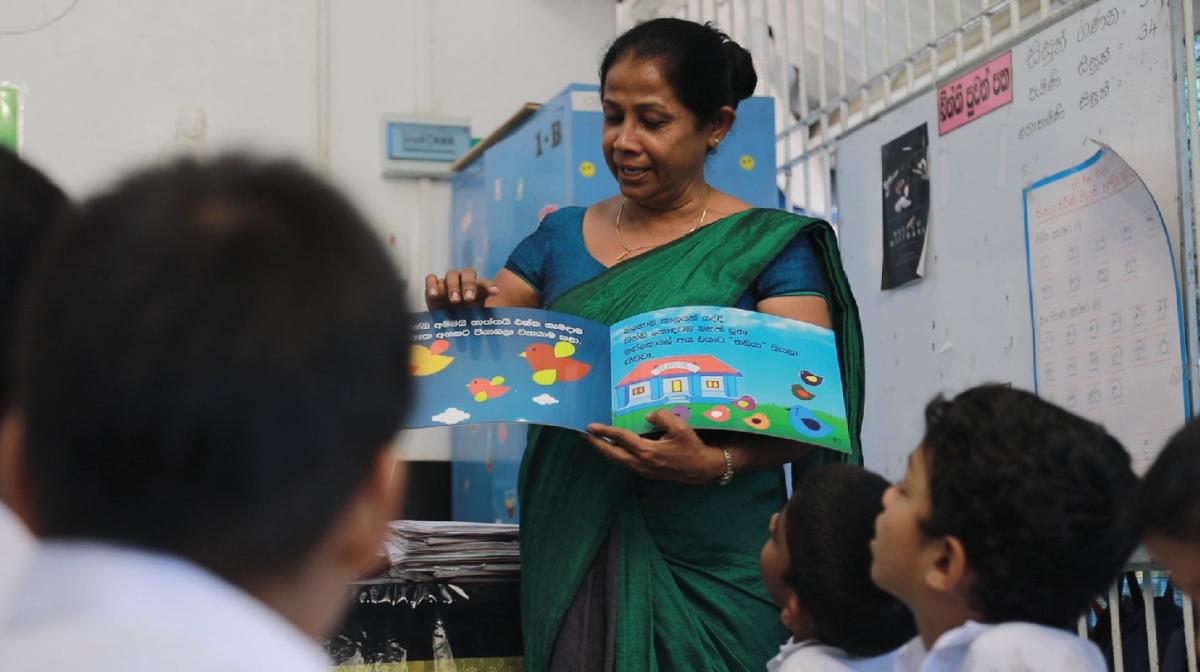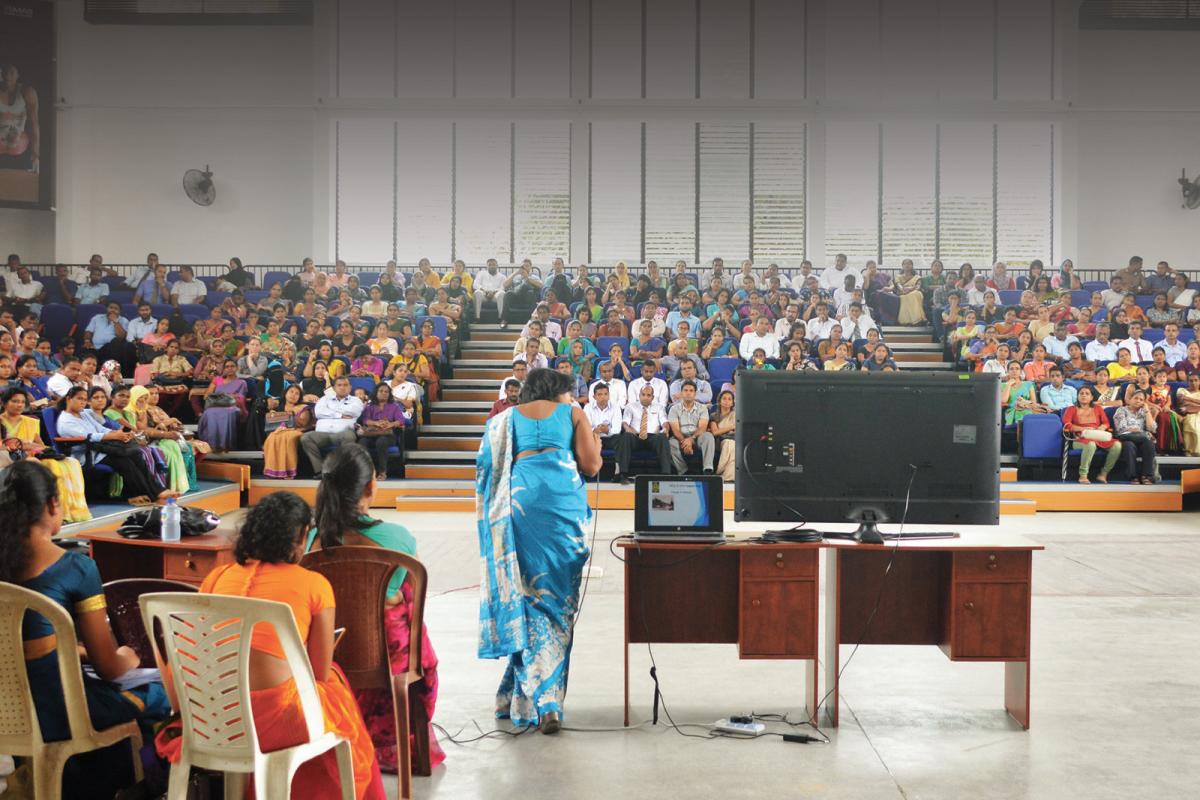NCD Alliance
Young leaders mobilise during lockdown in Sri Lanka to deliver life-saving treatment
26 Oct 2020
World Health Organization | 14 Sep 2023
In Sri Lanka, the Ministry of Health and the Ministry of Education partnered with the Sri Lanka College of Endocrinologists and Sri Lanka Medical Association to address the complex determinants and intergenerational challenges of unhealthy diets, obesity and physical inactivity. Through a school health programme, dedicated health promotion activities and improved national screening, the multisectoral initiative achieved a lasting, positive impact on tackling some of the major risk factors of cardiovascular disease and diabetes.
Obesity, unhealthy diet, and physical inactivity are major contributors to Sri Lanka’s growing health burden caused by noncommunicable diseases. About 25% of the Sri Lankan population reportedly live with hypertension or raised blood cholesterol, some 33% are estimated to be overweight or obese, and 7% experience raised blood glucose. Particularly for families with a lower income, a lack of knowledge about healthy food options combined with limited resources and cheaply available fast food causes a growing health challenge. In rural settings, communities only have limited access to primary health care and screening services, leading to later diagnoses with more severe cardiovascular complications and advanced stages of diabetes.

With financial support from the World Diabetes Foundation, Sri Lanka launched a multipronged, cross-sectoral initiative to tackle these growing health concerns around diabetes and modifiable cardiovascular disease risk factors in 2016.
“The very heart of our project was a school health programme targeting primary-school children, raising awareness on healthy eating, demonstrating the benefits of a healthier lifestyle for preventing NCDs”, said Dr Noel Somasundaram, the former Chief Endocrinologist and programme lead at the National Hospital of Sri Lanka. “At the same time, we put together a lifestyle project targeting young women and pregnant mothers, engaged in primary prevention using health promotion officers and community volunteers, and worked to enhance national screening services”, he explained.
Targeting schools made the initiative a multisectoral project from the get-go. To coordinate and monitor the implementation of the school health programme, a steering committee comprising representatives of the Ministry of Health, Ministry of Education, the Family Health Bureau, and the Sri Lanka College of Endocrinologists and Sri Lanka Medical Association as co-implementing partners was put in place.
“Working with young students and their teachers opened the door to reach families and communities. Many of the children aged 6-8 years we worked with were amazing messengers, and we empowered them to change to healthier eating habits themselves while also encouraging their siblings and parents at home.”
- Prof. Sumudu Seneviratne, University of Colombo & Lady Ridgeway Children Hospital -
While the original plan had been to engage with young adolescents in secondary schools, consultations with the Ministry of Education revealed a more urgent educational gap at primary school level. The school health programme therefore developed teaching materials, classroom activities, and games for younger children, and started rolling out a pilot programme to several primary schools between 2018 and 2019.
“Working with young students and their teachers not only offered schools a perk in our competitive educational landscape, but most importantly opened the door to reach families and communities”, recalled Prof. Sumudu Seneviratne, a Professor in Paediatric Endocrinology at the Faculty of Medicine of the University of Colombo and Honorary Paediatric Endocrinologist at Lady Ridgeway Children Hospital, who coordinated the school health programme. “Many of the children aged 6-8 years we worked with were amazing messengers, and we empowered them to change to healthier eating habits themselves while also encouraging their siblings and parents at home”, she added.

Parents started to pick up our messaging around NCD-risk factors, healthier eating habits and the benefits of physical activity, and helped spread the school health programmes’ messaging with their communities. At the same time, teachers enjoyed working with the new material and were equally motivated by the positive change they noted in their students’ eating habits at school. “One teacher told me that several children declined ice-cream during an annual class outing that year, as they recognised it as an unhealthy food option. She had never experienced this before in her several decades of teaching experience,” recalled Prof. Sumudu Seneviratne.
Alongside the school health programme, the College of Endocrinologists also engaged with civil society organizations to amplify NCD awareness in communities and rally support for healthy lifestyle initiatives and screening activities. Several solidarity marches with mobile screening trucks were held with financial support from these organizations, including the Walk for Diabetes and Run for Life campaign.
“We quickly realized that there is a whole network of nongovernmental and civil society organizations, health professionals and motivated individuals who could support our cause and were willing to amplify our messaging and reach.”
- Dr Noel Somasundaram, National Hospital of Sri Lanka -
At the College of Endocrinologists, doctors and health experts produced and reviewed the educational materials for the school health programme, as well as additional tools for wider health promotion activities. This included training sessions on NCD prevention and health promotion for volunteers, as well as project management courses focusing on multisectoral implementation and interdisciplinary communication.
“We quickly realized that there is a whole network of nongovernmental and civil society organizations, health professionals and motivated individuals who could support our cause and were willing to amplify our messaging and reach”, recalled Dr Noel Somasundaram.
Supported by the multisectoral steering committee’s work, the Ministry of Health scaled up NCD services in more than 700 lifestyle centres across the country, where people can measure their fasting blood sugar, lipid profiles, blood pressure, height, weight, and body mass index, or consult on health and lifestyle questions. Through these healthy lifestyle centres, the screening for diabetes and cardiovascular diseases increased by 30% nationally.
Following the pilot programme, the Ministry of Education’s started to extend the school health programme across the country, training in-service advisers who continued training teachers within their respective districts. Due to the COVID-19 pandemic, the rollout however had to be put on halt. “We would like to kick-start this programme with a new national implementation strategy”, said Prof. Sumudu Seneviratne. “For those children and their families involved in the pilot project, we made a lasting, sustainable impact for better health across generations, and we would like to continue this important work”, she concluded.
This feature story is part of a series compiling country experiences in leveraging multisectoral action for improved NCD and mental health policies and programmes. Read more on the key role of whole-of-government-approaches to tackle NCDs and mental health conditions in the global mapping report, or visit the digital repository on multisectoral action to explore further country experiences.
This country story is also available as a detailed country case study in the WHO Compendium report on multisectoral actions for the prevention and control of noncommunicable diseases and mental health conditions. Read the full report or directly access the country story via below link.